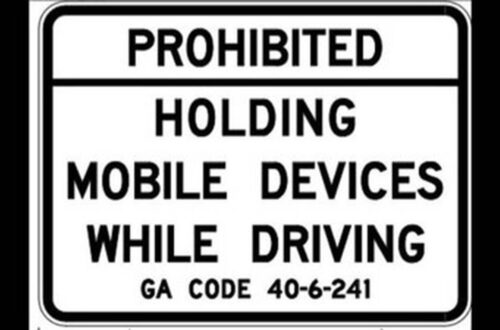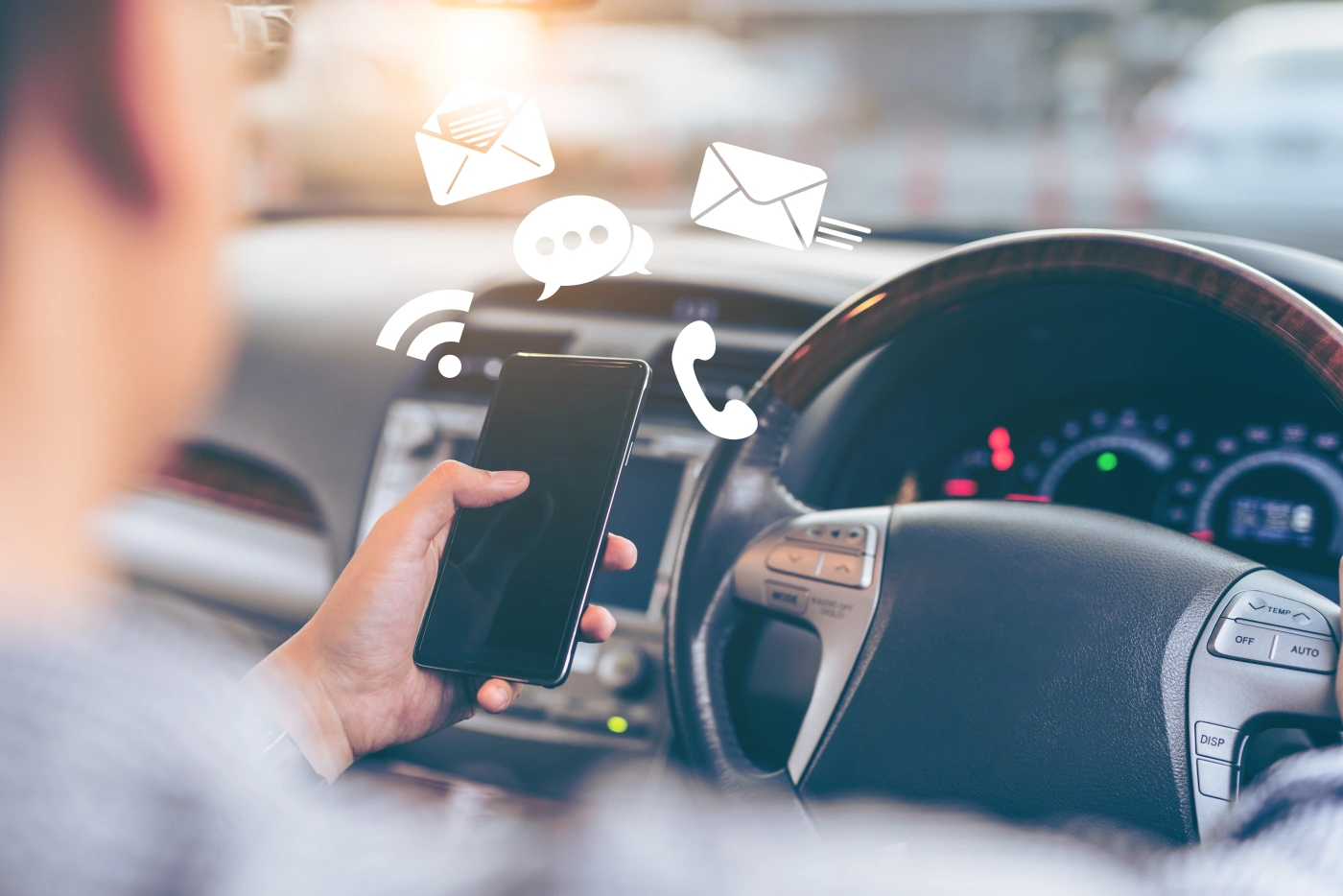If you're curious about the causes of texting while driving accidents, factors like driver distraction, peer influence, time pressure, addiction to technology, and lack of awareness are key contributors. Distractions from texting can take your eyes, mind, and hands off driving, leading to disastrous outcomes. These elements shed light on the reasons behind these incidents and the importance of understanding them further.
Driver Distraction
Driver distraction greatly heightens the risk of texting while driving accidents. When you take your eyes off the road to read or send a text, you are putting yourself and others in danger. That split-second of distraction can lead to devastating consequences. Your focus should always be on the road ahead to guarantee the safety of everyone on the street.
Not only visual distraction but also cognitive distraction plays a significant role. When you are mentally engaged in composing a text message, your attention is diverted from driving. Your brain is occupied with forming sentences and thoughts, making it harder to react quickly to unexpected situations on the road. It's vital to keep your mind focused on driving at all times.
Furthermore, manual distraction, such as physically holding your phone to text, impairs your ability to control the vehicle properly. Your hands should be on the wheel to steer and react promptly if needed. Remember, avoiding distractions while driving is essential for your safety and the safety of those around you.
Peer Influence
Being influenced by peers can greatly impact your decision-making while behind the wheel. When your friends or passengers encourage texting while driving or engage in this behavior themselves, you may feel pressure to do the same. Peer influence can create a dangerous situation where the desire to fit in or impress others overrides your better judgment. In a group setting, the fear of missing out on social interactions or being seen as uncool can lead you to engage in risky behaviors like texting while driving.
Moreover, seeing your peers text while driving normalizes this behavior in your social circle. It can make you perceive texting behind the wheel as acceptable or even expected, increasing the likelihood of engaging in this dangerous activity. The influence of your peers can weaken your resolve to prioritize safety over staying connected, making it vital to surround yourself with friends who prioritize safe driving habits. Remember, taking control of your decisions and resisting peer pressure when it comes to texting while driving is extremely important.
Time Pressure
Feeling rushed or overwhelmed by time constraints can greatly increase the likelihood of engaging in texting while driving. When you're in a hurry or feeling pressured by time, the temptation to quickly respond to messages while behind the wheel becomes stronger. Here are some key points to ponder regarding time pressure and texting while driving:
- Increased distraction: Time pressure can divert your focus from the road to your phone.
- Rushed decision-making: Feeling pressed for time may lead you to make impulsive and risky choices.
- Reduced reaction time: When you're in a hurry, your reaction time to unexpected events decreases.
- Heightened stress levels: Time constraints can elevate stress levels, affecting your ability to concentrate on driving.
- Diminished awareness: Being under time pressure may cause you to overlook the dangers of texting while driving.
Addiction to Technology
Amidst the modern era's technological advancements, an increasing reliance on smartphones and other gadgets has fostered a pervasive addiction to technology, magnifying the risks of texting while driving. The constant notifications, social media updates, and the urge to stay connected have led many individuals to develop a compulsive need to check their devices regularly. This addiction to technology creates a dangerous behavior pattern where drivers feel the need to respond to messages immediately, even when behind the wheel.
As this addiction grows, so does the likelihood of engaging in distracted driving activities like texting. The dopamine release associated with receiving messages or notifications acts as a reward system, reinforcing the behavior of checking the phone frequently. This continuous cycle of checking and responding to messages becomes ingrained in daily habits, making it challenging for individuals to resist the temptation, even when driving.
Ultimately, the addiction to technology not only poses a threat to individual safety but also endangers the lives of others on the road. Recognizing and addressing this addiction is vital in reducing the incidence of texting while driving accidents.
Lack of Awareness
Many drivers underestimate the dangers of texting while driving due to a lack of awareness about the potential consequences. It's important to understand the risks involved to prioritize safety on the road. Here are some key points to keep in mind:
- Distraction: Texting diverts your attention away from the road, heightening the likelihood of accidents.
- Impaired Reaction Time: Reading or sending a text while driving slows down your reaction time, making it harder to respond to sudden changes.
- Loss of Control: Taking your eyes off the road even for a few seconds can result in loss of control over your vehicle.
- Decreased Awareness: Texting while driving limits your awareness of your surroundings, putting you and others at risk.
- Increased Crash Risk: Engaging in texting while driving raises the chances of being involved in a crash.
Overconfidence
Overestimating your abilities while texting and driving can lead to dangerous situations on the road. Feeling overly confident in your multitasking skills while behind the wheel is a common mistake that many drivers make. This misplaced confidence can result in delayed reaction times, impaired decision-making, and an overall decrease in your ability to safely operate a vehicle.
When you believe that you are capable of successfully texting and driving without consequences, you are putting yourself and others at risk. Overconfidence can lead you to underestimate the dangers of distracted driving, leading to a false sense of security on the road. This can result in a lack of attention to your surroundings, failure to react promptly to sudden changes in traffic, and an increased likelihood of being involved in an accident.
Frequently Asked Questions
What Are the Long-Term Consequences of Texting While Driving Accidents on Victims and Their Families?
When you text while driving, the consequences can be devastating for victims and their families. Accidents caused by texting can lead to long-term physical injuries, emotional trauma, financial burdens, and even loss of life.
How Do Cultural Norms and Social Media Contribute to the Prevalence of Texting While Driving Accidents?
When cultural norms and social media promote multitasking and instant communication, it can influence your behavior on the road. These factors may lead to risky habits like texting while driving, increasing the likelihood of accidents.
Are There Any Effective Strategies or Interventions That Have Been Successful in Reducing Texting While Driving Accidents?
To reduce texting while driving accidents, consider implementing stricter laws, promoting awareness campaigns, utilizing technology like apps that block texts while driving, and encouraging peer influence to discourage the behavior. Stay vigilant and safe.
How Do Different States and Countries Address the Issue of Texting While Driving Through Legislation and Enforcement?
You can learn about how different states and countries tackle texting while driving through laws and enforcement. Understanding these approaches can provide insights into what works effectively in reducing this dangerous behavior on the roads.
What Role Do Car Manufacturers and Technology Companies Play in Preventing Texting While Driving Accidents Through the Development of Hands-Free Technology and Other Safety Features?
When it comes to preventing texting while driving accidents, car manufacturers and technology companies play an essential role. They develop hands-free technology and safety features that can help keep you focused on the road.
Conclusion
To sum up, texting while driving accidents are often caused by driver distraction, peer influence, time pressure, addiction to technology, lack of awareness, and overconfidence. These factors contribute to the dangerous behavior of texting behind the wheel, putting not only the driver at risk but also others on the road. It is important to recognize and address these factors to prevent further accidents and promote safer driving habits. Stay focused, stay safe.


